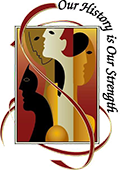By walking history’s pathways, we learn to step forward with confidence. The legacy of how others shaped society sparks our own longings to contribute. Everyone needs role models — footsteps enough like our own to inspire us.
History must tell the whole story. For girls, knowing women’s achievements expands their sense of what is possible. For all of us, knowledge of women’s strengths and contributions builds respect and nourishes self esteem — crucial to all children and adults now, and in the years to come.
Educators are willing, often eager, to introduce women’s history. But they lack materials and support. Only three percent of educational materials focus on women’s contributions. Yet recently legislatures in three states — Illinois, Florida, and Louisiana–mandated teaching women’s history in their K–12 classes.
The need for more accurate information about women’s historical contributions is further confirmed in a recent poll funded by General Motors. Conducted prior to GM’s sponsorship of a Ken Burns’ film on Elizabeth Cady Stanton and Susan B. Anthony, two women “who transformed a nation,” the results show only one percent could identify Stanton as in some way connected with women’s rights.
The enduring goal of the NWHP is to “make history” accurate by continuing to recognize and celebrate women’s authentic contributions through its current and future projects.
“Thanks to the NWHP’s successes, more teachers and students now understand women’s achievements in the fields of math, science, art and literature, and know of inspiring, culturally diverse role models in a wide range of fields throughout our history. Your integration of race, national origin, and gender issues in your training is of great importance in Nebraska where our minority students frequently feel isolated and lack role models in their school settings.”
~ Sex Equity Project Director, Nebraska Department of Education
“NWHP has provided leadership to schools, producing workshops and curriculum materials to help educators teach balanced history effectively. Due to this pioneering work, many school districts have now added women’s history to their school curricula. Attendance at your workshops changed my feelings forever. Now I understand the power of knowing about women in history.”
~ Sex Equity Project Coordinator, Wisconsin Department of Public Education



